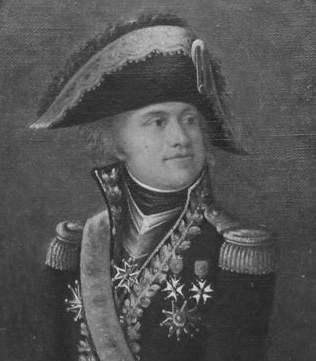General Joseph Augustin Fournier de Loysonville Daultanne

Born: August 18, 1759
Place of Birth: Valréas, Vaucluse, France
Died: January 7, 1828
Place of Death: Valréas, France
Arc de Triomphe: DAULTANNE on the west pillar
Pronunciation:
The son of the seigneur of Loysonville, Joseph Augustin Fournier de Loysonville Daultanne, sometimes spelled Daultane or d'Aultane, began his military career as a gentleman cadet in the infantry regiment of Marche in 1776. Two years later he was commissioned as a sous-lieutenant and then in 1779 he joined a company of chasseurs. In 1783 he was promoted to lieutenant. After the onset of the French Revolution, in 1792 Daultanne served in the Army of the North before becoming an aide-de-camp to General Grandpré in the Army of the South. The following year he joined the Army of the Moselle and then in January of 1794 he was promoted to chef de bataillon. When the Army of the Sambre and Meuse was created that summer, Daultanne served with them and that August he was promoted by the representative of the people to the rank of chef de brigade. In 1796 he served at Salzberg in July and then Amberg in August. Daultanne was designated for the Army of England in 1798 and he later joined the Army of Mainz. In 1799 he joined the Army of the Danube and he was promoted to général de brigade. That March he served in General Jourdan's staff at Stockach. In 1800 Daultanne was given command of a brigade of cavalry in Montrichard's division in the Army of the Rhine and he led them at Stockach and Memmingen in May. Next he became chief of staff to General Grenier and that December he served at the Battle of Hohenlinden.
Towards the end of 1801 Daultanne was named commander at Sarrelouis. In 1804 he was no longer employed due to an association with the disgraced General Moreau. However, when in 1805 the Grande Armée set out to confront the Third Coalition, Daultanne was named chief of staff of Marshal Davout's III Corps. He served throughout the campaign of 1805 and at the Battle of Austerlitz in December. The next year Daultanne took part in the campaign against Prussia and he fought at Auerstädt in October and then in December he led Gudin's division at the Battle of Pultusk . In recognition of his services, he was promoted to général de division at the end of the year. Continuing to serve with III Corps, in February of 1807 Daultanne served at the Battle of Eylau. Five months later he was named governor of Warsaw.
In 1808 Daultanne was named a Baron of the Empire and then sent to Spain where he would remain for much of the remainder of his career. In November he became chief of staff of Mortier's V Corps. Three years later in 1811 Daultanne was named chief of staff of the Army of the Center and then in 1812 he became the deputy chief of staff. That May he was named commander at Toledo and then in November he was honored as a Commander of the Order of Charles Frederick of Baden. As the French suffered setbacks and fell back in 1813, Daultanne began serving with the Army of the Pyrenees. He was authorized to leave the army and return home but instead he remained with the army where in 1814 he became Marshal Soult's chief of staff. That January Daultanne served at the attack of Saint-Etienne-de-Baïgorry and then in April he served at the Battle of Toulouse .
After Napoleon's abdication and the Bourbon Restoration, Daultanne was named inspector general of infantry, a marquis, and a Knight of Saint Louis. With Napoleon leaving exile and returning to France in March of 1815, Daultanne was named chief of staff of the Duke of Angoulême in the south. He negotiated the surrender of La Palud with General Gilly who had rallied to Napoleon. Now back in power, Napoleon summoned Daultanne to Paris to give him a command but Daultanne refused to serve. In response Daultanne was dismissed from the army, sent to Grenoble, and put under surveillance. After Napoleon's second abdication ended the Hundred Days, Daultanne briefly returned to the army but in October he refused a new command and asked for retirement, which was granted.
Bibliography
- Divry, Arnauld. Les Noms Gravés sur l'Arc de Triomphe. Paris: L'Harmattan, 2017.
- Six, Georges. Dictionnaire Biographique des Généraux & Amiraux Français de la Révolution et de l'Empire (1792-1814). 2 vols. Paris: Gaston Saffroy, 2003.
Updated September 2020
© Nathan D. Jensen